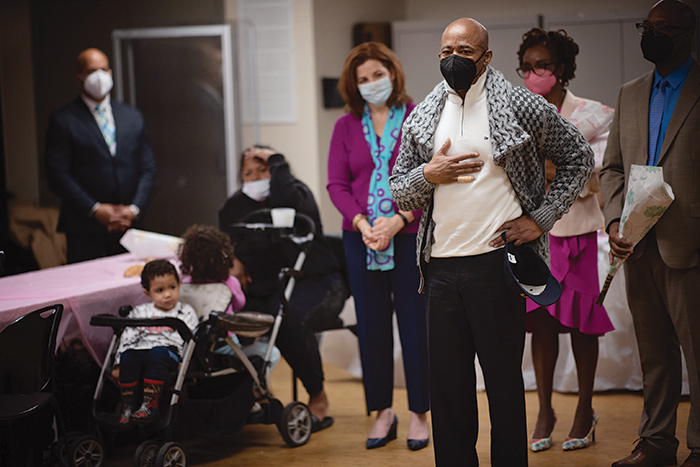Photo Courtesy of Michael Appleton/Mayoral Photography Office
“The Pandemic Response Institute will bring together city agencies, experts across various fields, and nonprofit and for-profit partners to tackle some of the biggest, most intractable public health challenges for New Yorkers,” Mayor Adams said.
By Forum Staff
The City this week launched the Pandemic Response Institute, a new partnership with Columbia University and The City University of New York Graduate School of Public Health and Health Policy (CUNY SPH) to help New York City learn from the lessons of the COVID-19 pandemic and tackle the urgent public health emergencies currently facing New Yorkers — from infectious diseases to climate-related events, Mayor Eric Adams said on Tuesday.
According to the administration, the PRI will help the city develop greater resilience to the adverse consequences of public health emergencies — maximizing engagement and impact across the city, particularly in underserved communities, with community-based locations in each borough.
In coordination with the New York City Department of Health and Mental Hygiene (DOHMH) and New York City Emergency Management (NYCEM), the PRI will work with New Yorkers in communities across the five boroughs to develop locally tailored health solutions, information, and resources to prepare for, respond to, and recover from future health crises. The PRI previously received critical funding from the New York City Economic Development Corporation (NYCEDC).
The PRI includes diverse partnerships with dozens of nonprofit, community, faith-based, research, and corporate entities — including Amazon and Cepheid — that responded to COVID-19 across New York City and are committed to the PRI’s whole-of-society approach. Together, this diverse group of contributors brings the necessary resources, expertise, commitment, and vision to the critical task of equipping New York City to prepare and respond to future public health emergencies and to invest in more robust infrastructure and greater health equity in New York City.
Following a request for proposals for the PRI last year, NYCEDC, DOHMH, and NYCEM reviewed and selected Columbia with key partner CUNY SPH, and the city awarded $20 million in capital funding for eligible costs.
To learn more about the New York City Pandemic Response Institute, visit pri.nyc.
“We can’t wait for the next COVID-19 to arrive to look for downstream responses — we have urgent public health crises in our city, and we need to proactively face them with upstream solutions,” Adams said. “The Pandemic Response Institute will bring together city agencies, experts across various fields, and nonprofit and for-profit partners to tackle some of the biggest, most intractable public health challenges for New Yorkers. I look forward to working with the PRI to help grow our public health toolbox with the strategic upstream solutions we need to tackle these crises.
“Preparing for the next generation of public health emergencies demands strengthening core and non-emergent public health infrastructure, including our frontline community health workforce, surveillance and interoperable data systems, strategic communication functions, and public health policy development — all with an eye toward addressing structural inequities in our recovery and ensuring strong relationships and partnership with communities,” said DOHMH Commissioner Dr. Ashwin Vasan. “In support of government and a whole-of-society approach to pandemic response, PRI will help spur innovation and will be a vital public health workforce capacity builder and community partner. We look forward to being a part of PRI and to supporting all partners as our city continues to recover, heal, and prepare for a brighter, healthier future.”

